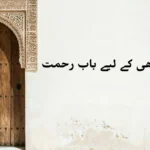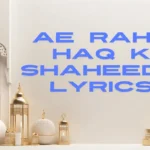The naat Is Karam Ka Karoon Shukar Kaisay Ada is a heartfelt expression of thankfulness and devotion to Allah and His beloved Prophet Muhammad (PBUH). Each verse carries a spiritual depth, highlighting the transformative power of faith, the blessings of association with the Prophet, and the boundless mercy of Allah. Below, we analyze each verse for its meaning and significance.
| Ab Mujhe Koi Sakina Nahi Kehta Baba Lyrics |
| Wah Kya Judo Karam Naat Lyrics in Urdu |
| Naat Taiba Ke Jane Wale Lyrics in Urdu |
| Naat-e-Rasool Tanam Farsooda Jaan Para Lyrics |
1. is karam ka karoon shukar kaise ada lyrics
جو مجھ پر میرے نبیؐ کر دیا
“How can I thank for the grace bestowed upon me by my Prophet?”
This opening verse encapsulates profound gratitude. The speaker acknowledges the immeasurable blessings granted through the Prophet Muhammad (PBUH). It reminds us of how every believer’s life is enriched by the guidance and love of the Prophet.
Reflection:
Gratitude is an essential aspect of worship. Acknowledging divine mercy fosters a deep connection with Allah, encouraging believers to lead a life of humility and devotion.
2. Mein Sajata Tha Sarkar Ki Mahfilen
مجھ کو ہر غم سے رب نے بری کر دیا
“I used to arrange gatherings for my beloved Prophet; Allah relieved me of all my worries.”
Here, the poet describes the spiritual elevation achieved through hosting gatherings in honor of the Prophet (PBUH). The blessings of such acts bring peace, ease, and protection from life’s hardships.
Reflection:
Organizing religious assemblies is a way to earn Allah’s favor, as it creates an environment of dhikr (remembrance) and love for the Prophet, leading to inner tranquility.
3. Zikr-e-Sarkar Ki Hain Barri Barkaten
مل گئیں راحتیں عظمتیں رفعتیں
“The mention of the Prophet brings immense blessings, comfort, and honor.”
This verse emphasizes the countless blessings associated with remembering and praising the Prophet Muhammad (PBUH). It is a reminder that invoking his name brings spiritual elevation and worldly peace.
Reflection:
The power of dhikr is transformative. When believers remember Allah and His Messenger, they open themselves to divine blessings that enrich their lives both spiritually and materially.
4. Mein Gunahgar Tha Be-Amal Tha Magar
مصطفیؐ نے مجھے جتنا کریم کر دیا
“I was a sinner with no good deeds, but Mustafa transformed me with his kindness.”
This line highlights the boundless mercy of the Prophet Muhammad (PBUH). The poet humbly admits their flaws but expresses gratitude for the honor of being transformed by the Prophet’s intercession.
Reflection:
This verse reminds us that no matter how far we stray, the mercy of the Prophet and Allah is always within reach, offering hope and redemption.
5. Lamha Lamha Hai Mujh Par Nabi Ki Ataa
دوستو اور مانگوں میں مولا سے کیا
“Every moment is filled with the Prophet’s blessings; what more could I ask from my Lord?”
The poet acknowledges continuous blessings from the Prophet and finds contentment in them, realizing that no worldly possession could equal the gift of being an ummati (follower) of Muhammad (PBUH).
Reflection:
Contentment is a key to happiness. Recognizing divine blessings fosters gratitude and shifts focus from material pursuits to spiritual fulfillment.
6. Koi Mayoos Lauta Nah Darbaar Se
جو بھی مانگا ملا میری سرکار سے
“No one has ever returned empty-handed from the Prophet’s court; whatever was sought was granted.”
This verse reflects the generosity of the Prophet (PBUH) and his unwavering compassion for his followers. It inspires hope in Allah’s mercy through the intercession of the Prophet.
Reflection:
Believers are encouraged to turn to Allah with unwavering faith, knowing that their sincere prayers will be answered, whether immediately or in ways they may not yet understand.
7. Jo Bhi Aaya Hai Mehfil Mein Sarkar Ki
حاضری مل گئی جس کو دربار کی
“Whoever attended the Prophet’s gathering gained acceptance in the divine court.”
Attending gatherings in honor of the Prophet not only brings spiritual benefits but also elevates a person’s status in the eyes of Allah.
Reflection:
The value of religious gatherings lies in their ability to connect believers with their faith and inspire them toward greater devotion.
8. Koi Siddiq Wafa, Roqi o Usman Sunhwa
اور کسی کو نبی نے علی کر دیا
“Some were made as truthful as Siddiq, steadfast as Umar, generous as Uthman, and courageous as Ali.”
The poet alludes to the noble companions of the Prophet, each of whom exemplifies an extraordinary quality. This serves as a reminder of the Prophet’s ability to inspire greatness in his followers.
Reflection:
The companions of the Prophet serve as role models for all Muslims, exemplifying qualities like truthfulness, steadfastness, generosity, and courage.





FAQs:
This naat emphasizes gratitude to Allah and the Prophet Muhammad (PBUH) for their countless blessings. It inspires believers to recognize the transformative power of faith and remain grateful for divine mercy.
Hosting such gatherings promotes love and reverence for the Prophet, creates an environment of dhikr (remembrance), and attracts divine blessings, peace, and protection.
The lyrics remind believers that no matter how flawed they are, Allah’s mercy and the Prophet’s intercession can bring transformation, offering hope and redemption.
Conclusion
The naat “is karam ka karoon shukar kaise ada lyrics” is a poetic journey of gratitude, hope, and devotion. Its lyrics not only inspire deep reflection but also encourage believers to strengthen their connection with Allah and His beloved Prophet (PBUH). By embracing the themes of this naat, one can find spiritual elevation, inner peace, and the motivation to lead a life of gratitude and faith.




